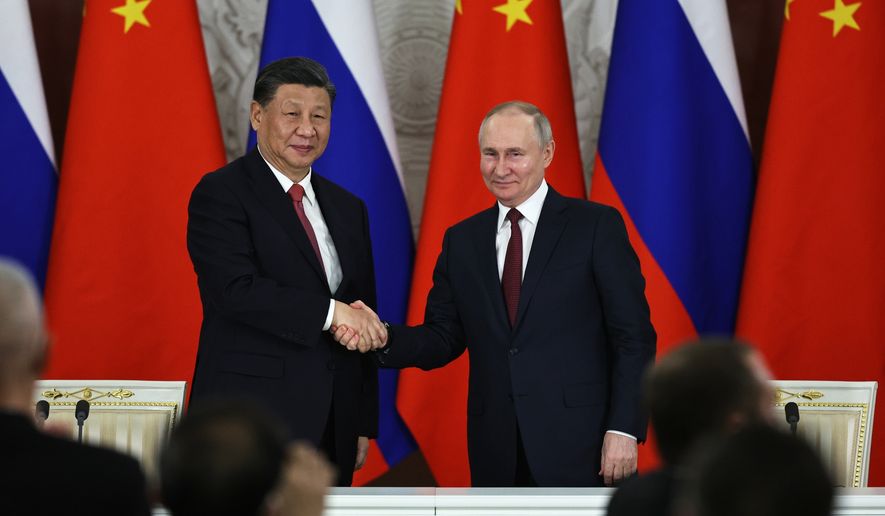The top House Republican on foreign policy warns that China and Russia have formed an “unholy alliance” against the United States and that the Biden administration is failing to deter aggressive Russian and Chinese actions on the world stage.
President Biden’s “projection of weakness” in the 2021 Afghanistan withdrawal was a turning point in foreign adversary aggression, according to House Foreign Affairs Committee Chairman Michael McCaul, who warned over the weekend that Russian and Chinese strategic collaboration has since been rising.
“Because of [Mr. Biden’s] projection of weakness … when Afghanistan imploded … that is when everything changed,” Mr. McCaul said in an interview with “Fox News Sunday.”
“Afghanistan was a turning point,” the Texas Republican said. “It was a disaster, we left Americans behind, Afghan partners behind.”
At a moment when many analysts describe the rise of a Cold War 2.0 between the U.S. and Western democracies on one side and China and Russia on the other, Mr. McCaul argued that Washington should be pursuing a “peace through strength” foreign policy.
Former President Ronald Reagan pushed that doctrine during the 1980s, and many have credited it with bringing about the end of the Cold War between the U.S. and the former Soviet Union.
“When you project weakness, you invite aggression and war. When you project strength, like Reagan talked about, you invite peace,” Mr. McCaul said Sunday.
“You are seeing … Iran getting aggressive and now, [Russian President Vladimir] Putin invading Ukraine,” he said, adding that Chinese President Xi Jinping is now “threatening Taiwan and the Pacific.”
“All these things are happening at the same time and it is not by accident, it is by design — and it’s a weak foreign policy out of fear,” the congressman said.
Mr. McCaul underscored the significance of growing China-Russia collaboration against the backdrop of Moscow’s invasion of Ukraine.
Mr. Xi made global headlines last week by traveling to Moscow in a show of solidarity with Mr. Putin against the United States and other Western democracies.
“This is an unholy alliance — they’re buying weapons from Iran and North Korea — they’re all tied together in this thing,” said Mr. McCaul, who warned that if Russia succeeds in Ukraine, it may embolden China to take military action against Taiwan.
“It is a geopolitical fight between tyranny and oppression versus democracy and freedom in the West,” he said. “What happens in Ukraine directly affects Taiwan and the Pacific, and we need to deter on both sides. My argument is this administration has wholly failed in that deterrence.”
For its part, the Biden administration has touted its success in upholding an alliance of democracies to back Ukraine, level sanctions against Russia and counter China’s rising aggression in the Pacific.
Secretary of State Antony Blinken warned last week that if the U.S.-led coalition supporting Ukraine falters, it will “open a Pandora’s box” in which China and other countries think they can attack smaller states with impunity.
Mr. Blinken told a Senate Appropriations subcommittee that China is watching the staying power of the international coalition behind Ukraine “very carefully.”
“They will draw lessons for how the world comes together — or doesn’t — to stand up to this aggression,” the secretary of state said in reference to Russia’s military invasion of Ukraine, which began in February 2022. “If we allow the Russian aggression in Ukraine to go forward with impunity … we open a Pandora’s box around the world, where would-be aggressors everywhere look at this and say, ‘If they can get away with it, I can too.’”
• Guy Taylor can be reached at gtaylor@washingtontimes.com.




Please read our comment policy before commenting.